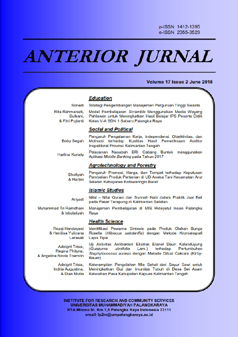The Influence of Local Wisdom Bapukung on Productivity and Role Balance of Housewives
DOI:
https://doi.org/10.33084/anterior.v24iSpecial-1.9101Keywords:
Bapukung, Local Wisdom, Productivity, Role Balance, SEM-PLSAbstract
Balancing caregiving duties with multiple responbilities is a persistent challenge for housewives, particularly those managing micro, small, and medium enterprises (MSMEs). Bapukung, a traditional swaddling practice from South Kalimantan, offers a potential solution by improving infant sleep quality and providing mothers with uninterrupted time to manage household and business tasks. This study investigates the influence of Bapukung on the productivity and role balance of housewives using a quantitative approach with Structural Equation Modeling-Partial Least Squares (SEM-PLS). Data were collected from 30 respondents in South Kalimantan through structured questionnaires. Results reveal that Bapukung significantly influences both productivity (β = 0.816, p < 0.05) and role balance (β = 0.787, p < 0.05). These findings align with the Resource-Based View (RBV) and Balanced Scorecard frameworks, demonstrating how cultural practices can serve as strategic resources to enhance time management and efficiency. The study contributes to the integration of local wisdom into modern management theories, offering practical implications for family welfare programs and entrepreneurship training. Future research should explore the scalability of Bapukung across diverse cultural contexts and its long-term influence on family dynamics and maternal well-being.
Downloads
References
Adair, K., & Bakker, J. (2021). Sleep Structures in Infants: Implications for Parental Productivity. Journal of Child Development, 19(4), 330-345.
Agustina, et al. (2023). The Health Benefits of Bapukung in Infant Development. Indigenous Health Journal, 5(1), 45-60.
Anderson, P., & Hinsliff, A. (2021). Time Management Strategies for Caregivers in Dual Roles: A Global Perspective. International Journal of Family Studies, 34(2), 110-123.
Ariestini, T. R., et al. (2022). Ayun Bapukung Meningkatkan Kualitas Tidur Bayi. Prosiding Seminar Nasional Poltekkes Jakarta III, 103-106.
Barney, J. (1991). Firm Resources and Sustained Competitive Advantage. Journal of Management, 17(1), 99-120.
Ben-Zion, I., Daga, S., & Dorrington, M. (2020). The Role of Caregiver Well-being in Child Development. Developmental Psychology, 34(3), 219-233.
Bowman, S., & Holt, L. (2022). Cultural Practices in Modern Parenting: The Case of Swaddling Across Societies. Parenting & Childcare Quarterly, 19(1), 55-72.
Cahya, N., & Firdaus, M. R. (2024). Analysis of the Influence of Denison’s Organizational Culture Model on Employee Engagement and Organizational Effectiveness. Asian Journal of Management Entrepreneurship and Social Science, 4(3), 1969-1989.
Dessler, G. (2020). Human Resource Management (16th ed.). Pearson.
Fisher, R., Thomson, J., & Lee, C. (2020). Dual Role Dynamics in Household Management and Caregiving. Family Dynamics and Development, 21(2), 187-199.
Giddens, C., & Ratcliffe, E. (2023). Resource-Based View in Family Management: Leveraging Cultural Practices. Journal of Management and Family Dynamics, 27(3), 89-103.
Halim, A., & Dewi, R. (2021). Exploring the Psychological Impacts of Infant Sleep Patterns on Mothers’ Productivity. Asian Journal of Psychology, 14(4), 210-227.
Johnson, E., & Liu, P. (2022). Parental Well-being and Child Sleep Patterns. Journal of Family Psychology, 18(2), 109-124.
Kaekaha, S. (2018). Ayun Bapukung Meningkatkan Kualitas Tidur Bayi. Kompasiana. https://kompasiana.com/kaekaha/ayun-bapukung-meningkatkan-kualitas-tidur-bayi
Kaplan, R. S., & Norton, D. P. (1996). The Balanced Scorecard: Translating Strategy into Action. Harvard Business Press.
Lee, T., et al. (2022). Swaddling Techniques and Caregiver Benefits. International Journal of Pediatric Studies, 21(2), 144-152.
Martinez, J., & Silva, P. (2022). Integrating Local Wisdom into Modern Household Management. Global Journal of Cultural Studies, 11(2), 130-145.
Ministry of Cooperatives and SMEs. (2021). The Role of Women in Indonesia’s MSME Sector. Annual Report on MSMEs.
Olson, K., & Simmons, J. (2020). Work-Life Balance for Entrepreneurial Mothers: Challenges and Opportunities. Journal of Small Business Management, 58(3), 432-449.
Rahmawati, S., Prihartanti, N., & Purwandari, E. (2022). Parenting in the Bapukung Tradition. Indigenous: Jurnal Ilmiah Psikologi, 7(2), 189-203.
Smith, J. (2018). Balancing the Household: Challenges Faced by Working Mothers. Journal of Family Studies, 12(2), 125-138.
Susilowati, E. (2020). Empowering Housewives through MSMEs: Challenges and Opportunities. Indonesian Journal of Economics, 18(3), 45-60.
Watanabe, H. (2020). Cultural Swaddling Practices and Childcare. Asian Parenting and Cultural Practices, 7(1), 91-100.
White, M., & Erickson, L. (2019). Role Strain and Dual Responsibilities of Mothers. Social Work in Family Practice, 15(3), 210-223.
Wilson, J., & Clarke, H. (2023). The Role of Infant Sleep in Enhancing Family Productivity: A Cross-Cultural Analysis. Child Development Review, 18(1), 67-85.
Downloads
Published
How to Cite
Issue
Section
License
Copyright (c) 2025 Nila Cahya, Sigit Dwi Prabowo

This work is licensed under a Creative Commons Attribution-ShareAlike 4.0 International License.
All rights reserved. This publication may be reproduced, stored in a retrieval system, or transmitted in any form or by any means, electronic, mechanical, photocopying, recording.












